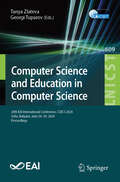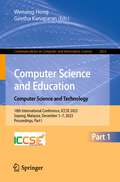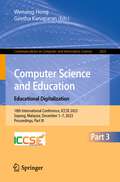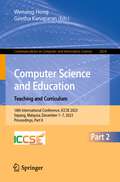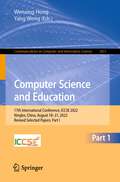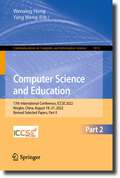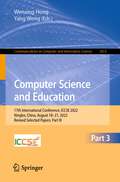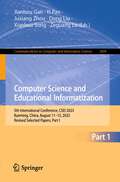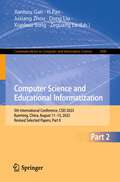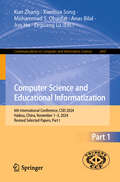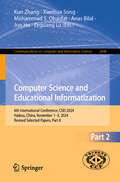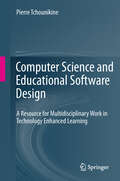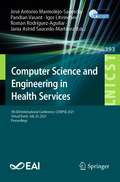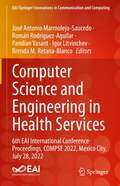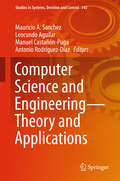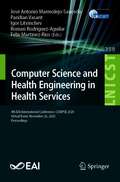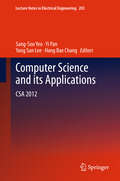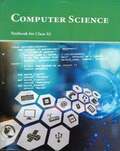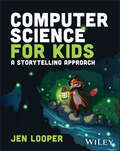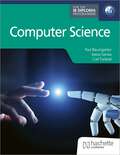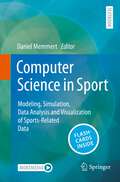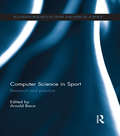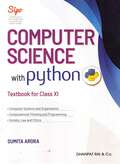- Table View
- List View
Computer Science and Education in Computer Science: 20th EAI International Conference, CSECS 2024, Sofia, Bulgaria, June 28–30, 2024, Proceedings (Lecture Notes of the Institute for Computer Sciences, Social Informatics and Telecommunications Engineering #609)
by Tanya Zlateva Georgi TuparovThis book constitutes the refereed post-conference proceedings of the 20th International Conference on Computer Science and Education in Computer Science, CSECS 2024, held in Sofia, Bulgaria, during June 28–30, 2024. The 19 full papers and 4 short papers were carefully reviewed and selected from 49 submissions.The papers cover the following topics: Computer Science Implementations; Computational Math; Computing Technologies; Implementations in Medicine; Engineering Implementations; Education in Computer Science.
Computer Science and Education. Computer Science and Technology: 18th International Conference, ICCSE 2023, Sepang, Malaysia, December 1–7, 2023, Proceedings, Part I (Communications in Computer and Information Science #2023)
by Wenxing Hong Geetha KanaparanThis three-volume set constitues selected papers presented at the 18th International Conference on Computer Science and Education, ICCSE 2023, held in Sepang, Malaysia, in December 2023. The 106 full papers and 36 short papers presented were thoroughly reviewed and selected from the 305 submissions. They focus on a wide range of computer science topics, especially AI, data science, and engineering, and technology-based education, by addressing frontier technical and business issues essential to the applications of data science in both higher education and advancing e-Society.
Computer Science and Education. Educational Digitalization: 18th International Conference, ICCSE 2023, Sepang, Malaysia, December 1–7, 2023, Proceedings, Part III (Communications in Computer and Information Science #2025)
by Wenxing Hong Geetha KanaparanThis three-volume set constitues selected papers presented at the 18th International Conference on Computer Science and Education, ICCSE 2023, held in Sepang, Malaysia, in December 2023. The 106 full papers and 36 short papers presented were thoroughly reviewed and selected from the 305 submissions. They focus on a wide range of computer science topics, especially AI, data science, and engineering, and technology-based education, by addressing frontier technical and business issues essential to the applications of data science in both higher education and advancing e-Society.
Computer Science and Education. Teaching and Curriculum: 18th International Conference, ICCSE 2023, Sepang, Malaysia, December 1–7, 2023, Proceedings, Part II (Communications in Computer and Information Science #2024)
by Wenxing Hong Geetha KanaparanThis three-volume set constitues selected papers presented at the 18th International Conference on Computer Science and Education, ICCSE 2023, held in Sepang, Malaysia, in December 2023. The 106 full papers and 36 short papers presented were thoroughly reviewed and selected from the 305 submissions. They focus on a wide range of computer science topics, especially AI, data science, and engineering, and technology-based education, by addressing frontier technical and business issues essential to the applications of data science in both higher education and advancing e-Society.
Computer Science and Education: 17th International Conference, ICCSE 2022, Ningbo, China, August 18–21, 2022, Revised Selected Papers, Part I (Communications in Computer and Information Science #1811)
by Wenxing Hong Yang WengThis three-volume set constitues selected papers presented during the 17th International Conference on Computer Science and Education, ICCSE 2022, held in Ningbo, China, in August 2022.The 168 full papers and 43 short papers presented were thoroughly reviewed and selected from the 510 submissions. They focus on a wide range of computer science topics, especially AI, data science, and engineering, and technology-based education, by addressing frontier technical and business issues essential to the applications of data science in both higher education and advancing e-Society.
Computer Science and Education: 17th International Conference, ICCSE 2022, Ningbo, China, August 18–21, 2022, Revised Selected Papers, Part II (Communications in Computer and Information Science #1812)
by Wenxing Hong Yang WengThis three-volume set constitues selected papers presented during the 17th International Conference on Computer Science and Education, ICCSE 2022, held in Ningbo, China, in August 2022.The 168 full papers and 43 short papers presented were thoroughly reviewed and selected from the 510 submissions. They focus on a wide range of computer science topics, especially AI, data science, and engineering, and technology-based education, by addressing frontier technical and business issues essential to the applications of data science in both higher education and advancing e-Society.
Computer Science and Education: 17th International Conference, ICCSE 2022, Ningbo, China, August 18–21, 2022, Revised Selected Papers, Part III (Communications in Computer and Information Science #1813)
by Wenxing Hong Yang WengThis three-volume set constitues selected papers presented during the 17th International Conference on Computer Science and Education, ICCSE 2022, held in Ningbo, China, in August 2022.The 168 full papers and 43 short papers presented were thoroughly reviewed and selected from the 510 submissions. They focus on a wide range of computer science topics, especially AI, data science, and engineering, and technology-based education, by addressing frontier technical and business issues essential to the applications of data science in both higher education and advancing e-Society.
Computer Science and Educational Informatization: 5th International Conference, CSEI 2023, Kunming, China, August 11–13, 2023, Revised Selected Papers, Part I (Communications in Computer and Information Science #1899)
by Yi Pan Xianhua Song Zeguang Lu Dong Liu Jianhou Gan Juxiang ZhouThese two volumes constitute the revised selected papers of the 5th International Conference, CSEI 2023, held in Kunming, China, during August 11–13, 2023.The 76 full papers and the 21 short papers included in this volume were carefully reviewed and selected from 297 submissions. They focus on computer science, education informatization and engineering education, innovative application for the deeper integration of education practice and information technology, educational informatization and big data for education.
Computer Science and Educational Informatization: 5th International Conference, CSEI 2023, Kunming, China, August 11–13, 2023, Revised Selected Papers, Part II (Communications in Computer and Information Science #1900)
by Yi Pan Xianhua Song Zeguang Lu Dong Liu Jianhou Gan Juxiang ZhouThese two volumes constitute the revised selected papers of the 5th International Conference, CSEI 2023, held in Kunming, China, during August 11–13, 2023.The 76 full papers and the 21 short papers included in this volume were carefully reviewed and selected from 297 submissions. They focus on computer science, education informatization and engineering education, innovative application for the deeper integration of education practice and information technology, educational informatization and big data for education.
Computer Science and Educational Informatization: 6th International Conference, CSEI 2024, Haikou, China, November 1–3, 2024, Revised Selected Papers, Part I (Communications in Computer and Information Science #2447)
by Mohammad S. Obaidat Xianhua Song Zeguang Lu Jun Hu Kun Zhang Anas BilalThese two volumes constitute the revised selected papers of the 6th International Conference, CSEI 2024, held in Haikou, China, during November 1–3, 2024. The 51 full papers included in these volumes were carefully reviewed and selected from 171 submissions. They cover a wide range of areas related to educational information science and technology, educational informatization and big data for education, innovative application for the deeper integration of education practice and information technology, and university engineering education.
Computer Science and Educational Informatization: 6th International Conference, CSEI 2024, Haikou, China, November 1–3, 2024, Revised Selected Papers, Part II (Communications in Computer and Information Science #2448)
by Mohammad S. Obaidat Xianhua Song Zeguang Lu Jun Hu Kun Zhang Anas BilalThese two volumes constitute the revised selected papers of the 6th International Conference, CSEI 2024, held in Haikou, China, during November 1–3, 2024. The 51 full papers included in these volumes were carefully reviewed and selected from 171 submissions. They cover a wide range of areas related to educational information science and technology, educational informatization and big data for education, innovative application for the deeper integration of education practice and information technology, and university engineering education.
Computer Science and Educational Software Design: A Resource for Multidisciplinary Work in Technology Enhanced Learning
by Pierre TchounikineDeveloping educational software requires thinking, problematizing, representing, modeling, implementing and analyzing pedagogical objectives and issues, as well as conceptual models and software architectures. Computer scientists face the difficulty of understanding the particular issues and phenomena to be taken into account in educational software projects and of avoiding a naïve technocentered perspective. On the other hand, actors with backgrounds in human or social sciences face the difficulty of understanding software design and implementation issues, and how computer scientists engage in these tasks. Tchounikine argues that these difficulties cannot be solved by building a kind of "general theory" or "general engineering methodology" to be adopted by all actors for all projects: educational software projects may correspond to very different realities, and may be conducted within very different perspectives and with very different matters of concern. Thus the issue of understanding each others' perspectives and elaborating some common ground is to be considered in context, within the considered project or perspective. To this end, he provides the reader with a framework and means for actively taking into account the relationships between pedagogical settings and software, and for working together in a multidisciplinary way to develop educational software. His book is for actors engaged in research or development projects which require inventing, designing, adapting, implementing or analyzing educational software. The core audience is Master's and PhD students, researchers and engineers from computer science or human and social sciences (e.g., education, psychology, pedagogy, philosophy, communications or sociology) interested in the issues raised by educational software design and analysis and in the variety of perspectives that may be adopted.
Computer Science and Engineering in Health Services: 5th EAI International Conference, COMPSE 2021, Virtual Event, July 29, 2021, Proceedings (Lecture Notes of the Institute for Computer Sciences, Social Informatics and Telecommunications Engineering #393)
by Pandian Vasant Igor Litvinchev José Antonio Marmolejo-Saucedo Roman Rodríguez-Aguilar Jania Astrid Saucedo-MartínezThis book constitutes the refereed post-conference proceedings of the 5th International Conference on Computer Science and Engineering in Health Services, COMPSE 2021, held in July 2021. Due to COVID-19 pandemic the conference was held virtually. The 17 full papers presented were carefully reviewed and selected from 46 submissions. The papers are grouped on thematic topics: application of tools delivered by the COVID-19 pandemic; health services; computer and data science; and industry 4.0 in logistics and supply chain.
Computer Science and Engineering in Health Services: 6th EAI International Conference Proceedings, COMPSE 2022, Mexico City, July 28, 2022 (EAI/Springer Innovations in Communication and Computing)
by Pandian Vasant Igor Litvinchev José Antonio Marmolejo-Saucedo Román Rodríguez-Aguilar Brenda M. Retana-BlancoThis book constitutes the refereed post-conference proceedings of the 6th EAI International Conference Computer on Science and Engineering in Health Services (COMPSE 2022), which took place in Mexico City and online, June 28th, 2022. The papers are grouped on thematic topics: application of tools delivered by the COVID-19 pandemic; health services; computer and data science; and industry 4.0 in logistics and supply chain. The content is relevant to researchers, academics, students and professionals.
Computer Science and Engineering—Theory and Applications
by Mauricio A. Sanchez Leocundo Aguilar Manuel Castañón-Puga Antonio Rodríguez-DíazThis book presents a collection of research findings and proposals on computer science and computer engineering, introducing readers to essential concepts, theories, and applications. It also shares perspectives on how cutting-edge and established methodologies and techniques can be used to obtain new and interesting results. Each chapter focuses on a specific aspect of computer science or computer engineering, such as: software engineering, complex systems, computational intelligence, embedded systems, and systems engineering. As such, the book will bring students and professionals alike up to date on key advances in these areas.
Computer Science and Health Engineering in Health Services: 4th EAI International Conference, COMPSE 2020, Virtual Event, November 26, 2020, Proceedings (Lecture Notes of the Institute for Computer Sciences, Social Informatics and Telecommunications Engineering #359)
by Pandian Vasant Igor Litvinchev José Antonio Marmolejo-Saucedo Roman Rodriguez-Aguilar Felix Martinez-RiosThis book constitutes the refereed post-conference proceedings of the 4th International Conference on Computer Science and Health Engineering in Health Services. Due to COVID-19 pandemic the conference was held virtually. The 16 full papers presented were carefully reviewed and selected from 39 submissions. The papers highlight the latest research innovations and applications of algorithms designed for optimization applications within the fields of science, computer science, engineering, information technology, economics, and health systems.
Computer Science and its Applications: CSA 2012 (Lecture Notes in Electrical Engineering #203)
by Yi Pan Hang Bae Chang Sang-Soo Yeo Yang Sun LeeThe 4th FTRA International Conference on Computer Science and its Applications (CSA-12) will be held in Jeju, Korea on November 22~25, 2012. CSA-12 will be the most comprehensive conference focused on the various aspects of advances in computer science and its applications. CSA-12 will provide an opportunity for academic and industry professionals to discuss the latest issues and progress in the area of CSA. In addition, the conference will publish high quality papers which are closely related to the various theories and practical applications in CSA. Furthermore, we expect that the conference and its publications will be a trigger for further related research and technology improvements in this important subject. CSA-12 is the next event in a series of highly successful International Conference on Computer Science and its Applications, previously held as CSA-11 (3rd Edition: Jeju, December, 2011), CSA-09 (2nd Edition: Jeju, December, 2009), and CSA-08 (1st Edition: Australia, October, 2008).
Computer Science class 11 - NCERT - 23
by National Council of Educational Research and TrainingThe NCERT Computer Science textbook for Class 11 aims to provide high school students with a foundational understanding of computer science and programming. The book starts with an introduction to what a computer is, its historical evolution, and its fundamental components. It covers hardware aspects like CPUs, memory, and I/O devices, as well as software elements including operating systems and application software. The textbook also delves into programming languages, offering a beginner's guide to algorithmic problem-solving and coding. It generally includes languages like Python or C++ to teach the basics of programming constructs like loops, conditional statements, and functions. Data representation and management are also discussed, offering insights into how data is stored and manipulated in a computer system. Networking fundamentals, including the basics of the internet and web technologies, are covered to help students understand how computers communicate. Security aspects, ethical computing, and emerging technologies are often included to give a rounded perspective. Overall, the textbook aims to be a comprehensive guide for students new to the realm of computer science.
Computer Science for Cambridge International AS and A Level
by Sylvia Langfield Dave DuddellThe aim of the Cambridge International AS and A Level Computer Science syllabus is to encourage learners to develop an understanding of the fundamental principles of computer science and how computer programs work in a range of contexts. Learners will study topics including information representation, communication and Internet technologies, hardware, software development, and relational database modelling. As they progress, learners will develop their computational thinking and use problem solving to develop computer-based solutions using algorithms and programming languages. Studying Cambridge International AS and A Level Computer Science will help learners develop a range of skills such as thinking creatively, analytically, logically and critically. They will also be able to appreciate the ethical issues that arise with current and emerging computing technologies.
Computer Science for Kids: A Storytelling Approach
by Jen LooperA kid-friendly and rigorous new way to teach young readers the fundamentals of computer science In Computer Science for Kids: A Storytelling Approach, AWS Head of Academic Advocacy and Google Developer Expert Dr. Jen Looper delivers a colorful, fun, and exciting demonstration for young readers who want to learn the basics of computer science. Using a variety of technologies, the book covers the elements of computer science in concise detail and illustrates how to build projects to learn foundational concepts behind the technology powering the internet. In the book, you’ll find projects to build using both basic and emerging technologies—like SQL, game development, storytelling software, and 3D augmented reality—as well as: Chapter projects aligned to K-12 curriculum standards for grades 6-8 and a GitHub repo featuring open-source projects Lesson plans for teachers An online space for classrooms to showcase and discuss their workAn easy-to-follow and kid-friendly new resource for technology-curious middle school students, Computer Science for Kids is the fun and interesting web development resource that classroom teachers, parents, and homeschooling families have been waiting for.
Computer Science for the IB Diploma
by Carl Turland Ioana Ganea Paul BaumgartenDeveloped in cooperation with the International Baccalaureate®Ensure students gain clarity, confidence, and an in-depth understanding to master the updated Computer Science syllabus for both Higher Level (HL) and Standard Level (SL). Closely following the structure of the revised guide, this new resource fully covers the updated assessment format and essential topics, organised by the two key themes, Concepts in Computer Science and Computational Thinking and Problem-Solving.Provide complete coverage of the latest syllabus set for first assessment in 2027 with a student-focused resource written by experienced educators and examiners. Empower students to navigate their coursework with confidence through an engaging, inquiry-based approach that emphasises conceptual understanding.Streamline your lesson planning; the unit and chapter titles match syllabus sections precisely to save you time and enhance learning efficiency. The resource also provides flexibility in choice of programming language to cater to diverse teaching and learning preferences. Support students' success with essential tools, including clear definitions of key terms, practical 'top tips,' cross-course questions, and highlights of common mistakes to avoid.Build confidence through engaging practical activities, chapter summaries, and targeted review questions that are designed to create a deep understanding of the subject matter.
Computer Science for the IB Diploma
by Carl Turland Ioana Ganea Paul BaumgartenDeveloped in cooperation with the International Baccalaureate®Ensure students gain clarity, confidence, and an in-depth understanding to master the updated Computer Science syllabus for both Higher Level (HL) and Standard Level (SL). Closely following the structure of the revised guide, this new resource fully covers the updated assessment format and essential topics, organised by the two key themes, Concepts in Computer Science and Computational Thinking and Problem-Solving.Provide complete coverage of the latest syllabus set for first assessment in 2027 with a student-focused resource written by experienced educators and examiners. Empower students to navigate their coursework with confidence through an engaging, inquiry-based approach that emphasises conceptual understanding.Streamline your lesson planning; the unit and chapter titles match syllabus sections precisely to save you time and enhance learning efficiency. The resource also provides flexibility in choice of programming language to cater to diverse teaching and learning preferences. Support students' success with essential tools, including clear definitions of key terms, practical 'top tips,' cross-course questions, and highlights of common mistakes to avoid.Build confidence through engaging practical activities, chapter summaries, and targeted review questions that are designed to create a deep understanding of the subject matter.
Computer Science in Sport: Modeling, Simulation, Data Analysis and Visualization of Sports-Related Data
by Daniel MemmertIn recent years, computer science in sport has grown extremely, mainly because more and more new data has become available. Computer science tools in sports, whether used for opponent preparation, competition, or scientific analysis, have become indispensable across various levels of expertise nowadays. A completely new market has emerged through the utilization of these tools in the four major fields of application: clubs and associations, business, science, and the media. This market is progressively gaining importance within university research and educational activities.This textbook aims to live up to the now broad diversity of computer science in sport by having more than 30 authors report from their special field and concisely summarise the latest findings. The book is divided into four main sections: data sets, modelling, simulation and data analysis. In addition to background information on programming languages and visualisation, the textbook is framed by history and an outlook. Students with a connection to sports science are given a comprehensive insight into computer science in sport, supported by a didactically sophisticated concept that makes it easy to convey the learning content. Numerous questions for self-testing underpin the learning effect and ensure optimal exam preparation. For advanced students, the in-depth discussion of time series data mining, artificial neural networks, convolution kernels, transfer learning and random forests offers additional value.
Computer Science in Sport: Research and Practice (Routledge Research in Sport and Exercise Science)
by Arnold BacaComputers are a fundamentally important tool in sport science research, sports performance analysis and, increasingly, in coaching and education programmes in sport. This book defines the field of ‘sport informatics’, explaining how computer science can be used to solve sport-related problems, in both research and applied aspects. Beginning with a clear explanation of the functional principles of hardware and software, the book examines the key functional areas in which computer science is employed in sport, including: knowledge discovery and database development data acquisition, including devices for measuring performance data motion tracking and analysis systems modelling and simulation match analysis systems e-learning and multimedia in sports education Bridging the gap between theory and practice, this book is important reading for any student, researcher or practitioner working in sport science, sport performance analysis, research methods in sport, applied computer science or informatics.
Computer Science with Python class 11
by Sumita AroraComputer Science With Python Textbook For Class-11 By Sumita Arora for ( 2020-2021) Examination.
